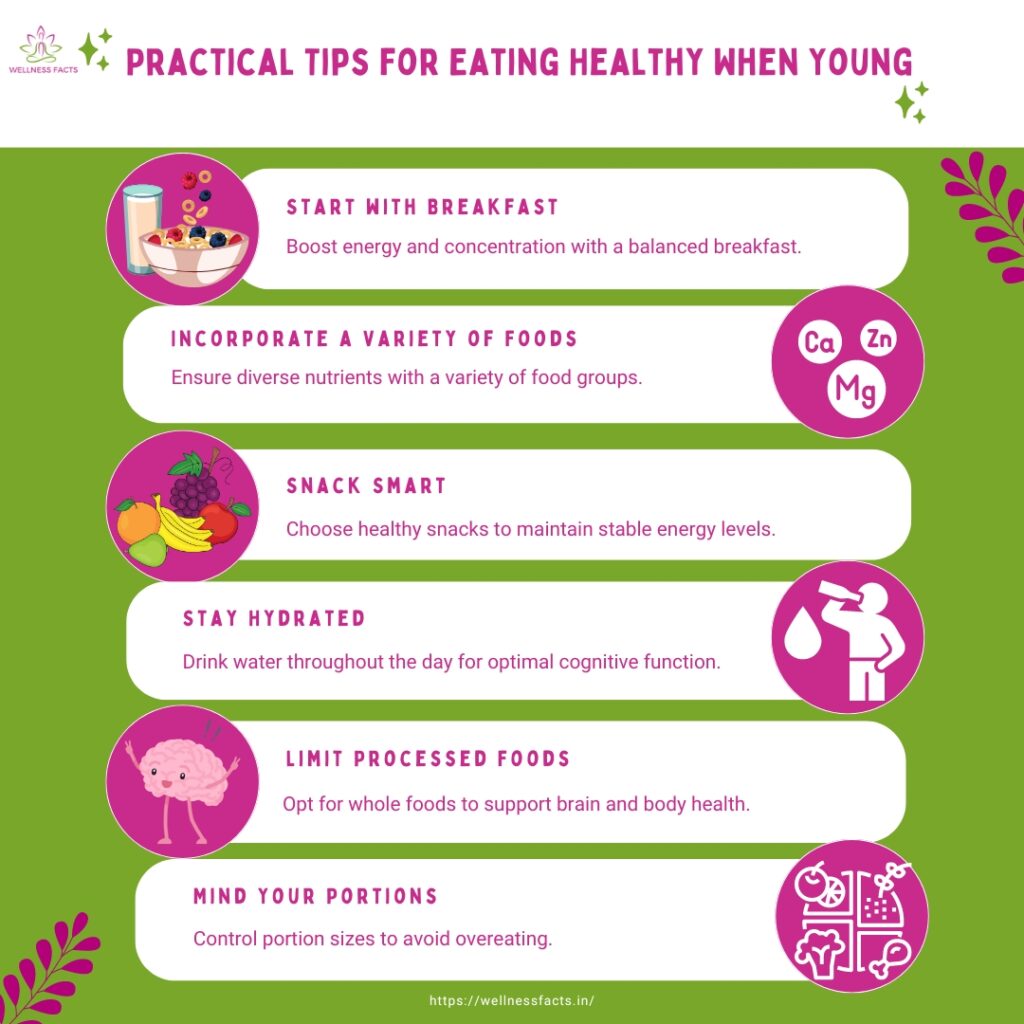In today’s fast-paced world, maintaining a healthy diet can often fall by the wayside. However, the importance of eating healthy from a young age cannot be overstated. Recent research has shown that a nutritious diet during youth can significantly impact cognitive function in later years. In this blog post, we will explore how early dietary choices can help you stay mentally sharp as you age, backed by scientific evidence and practical tips.
The Connection Between Diet and Cognitive Health
The Role of Nutrition in Brain Development
From the moment we are born, our brains undergo rapid development. Nutrients play a crucial role in this process, providing the building blocks for brain cells and supporting neurotransmitter function. Essential nutrients like omega-3 fatty acids, antioxidants, vitamins, and minerals are vital for optimal brain health.
Long-Term Benefits of a Healthy Diet
A balanced diet rich in fruits, vegetables, whole grains, lean proteins, and healthy fats not only supports physical health but also cognitive function. Studies have shown that individuals who maintain a healthy diet from a young age are less likely to experience cognitive decline as they age. This is because nutrients such as omega-3 fatty acids, antioxidants, and vitamins help protect the brain from oxidative stress and inflammation.
Key Nutrients for Cognitive Health
Omega-3 Fatty Acids:
Omega-3 fatty acids, which are found in fish, flaxseeds, and walnuts, are crucial for brain health. They support the structure of brain cells and improve communication between them. Consuming these fats regularly has been linked to a lower risk of cognitive decline and Alzheimer’s disease.
Antioxidants:
Antioxidants present in vibrant fruits and vegetables fight oxidative stress, which can harm brain cells. Foods rich in antioxidants, such as berries, spinach, and nuts, help protect the brain from age-related damage and improve memory and cognitive function.
Vitamins and Minerals:
Vitamins and minerals like B vitamins, vitamin E, and magnesium are crucial for brain health. B vitamins support energy production and neurotransmitter function, while vitamin E and magnesium help protect the brain from oxidative stress and inflammation. Incorporating foods like leafy greens, nuts, seeds, and whole grains into your diet can ensure you get these essential nutrients.
The Mediterranean diet serves as an exemplary model for promoting cognitive health
What is the Mediterranean Diet?
The Mediterranean diet is a well-researched dietary pattern known for its numerous health benefits, including improved cognitive function. It emphasizes the consumption of fruits, vegetables, whole grains, legumes, nuts, seeds, and healthy fats, such as olive oil. This diet also includes moderate amounts of fish, poultry, and dairy, with limited intake of red meat and sweets.
Benefits for Brain Health
Studies have shown that the Mediterranean diet can significantly reduce the risk of cognitive decline and Alzheimer’s disease. This is attributed to its high content of antioxidants, healthy fats, and anti-inflammatory compounds. Adopting this diet from a young age can provide long-term benefits for brain health and overall well-being.
Practical Tips for Eating Healthy When Young
Eating healthy from a young age sets the foundation for lifelong health and wellness. Here’s how you can start:

1. Start with Breakfast
Kickstart your day with a balanced breakfast to fuel your brain and body. Include protein, whole grains, and fruits to boost energy and concentration.
2. Incorporate a Variety of Foods
Ensure your meals include different food groups: vegetables, fruits, whole grains, and lean proteins. A varied diet provides all essential nutrients for brain and body health.
3. Snack Smart
Choose snacks like fruits, nuts, yogurt, or whole-grain crackers. Avoid sugary and processed snacks to maintain stable energy levels and prevent cognitive fog.
4. Stay Hydrated
Drink plenty of water throughout the day. Hydration is key for cognitive function, energy, and overall health. Limit sugary drinks and caffeine.
5. Limit Processed Foods
Processed foods frequently contain high levels of unhealthy fats, sugars, and sodium. Opt for whole, unprocessed foods to support brain function and overall health.
6. Mind Your Portions
Control portion sizes to avoid overeating. Use smaller plates and be mindful of serving sizes, especially with high-calorie foods.
Conclusion
Eating healthy when young is not only essential for physical health but also for maintaining cognitive function later in life. By incorporating nutrient-rich foods into your diet and following dietary patterns like the Mediterranean diet, you can protect your brain from age-related decline. Start making healthy choices today to enjoy a sharper mind tomorrow.
